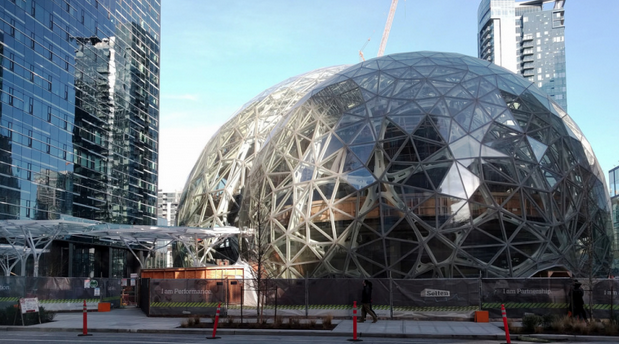Dear Cities: Resist Amazon's HQ2
There is something untoward about the feeding frenzy we are witnessing as cities across the country vie to be the site of Amazon’s second headquarters (“HQ2”).

Dear Cities: Resist Amazon's HQ2
There is something untoward about the feeding frenzy we are witnessing as cities across the country vie to be the site of Amazon’s second headquarters (“HQ2”). Amazon, after all, is the poster child for driving, first, independent booksellers and then retailers out of business, hollowing out communities across America. It is considered a meat grinder for white-collar workers who churn through the place at a rapid clip in search of their piece of the gold, and equally well-known for treating its warehouse workers like draft animals. It is also a notorious if not clever tax avoider. Just the kind of company you want to build your economic development strategy around, right? Yet cities are drooling over the opportunity to bribe the company with tax giveaways and other subsidies in a sickening and dumb race to the bottom in which citizens are the losers, and powerful companies (and their executives) only grow more powerful.
Reports suggest that Amazon will invest $5 billion and create 50,000 jobs over a ten-year period (with little common sense scrutiny), mostly in support areas like finance and accounting. We should be glad Amazon is searching in the US, and not in India, I suppose, since no doubt cost is a driving factor for the (barely) profitable Amazon. If we take founder and CEO Jeff Bezos at his word on Amazon’s “plans” (I view them as chum in the water to create a feeding frenzy), this would provide one of the largest single job creation and real estate development stimulus impacts since Disney moved into the Orlando area in the late 1960s. If the plans materialize (big if, see below), they will transform whatever city is chosen, for better (perhaps) and for worse.
Of course, mayors and real estate developers are huddled in their “war rooms” to rashly cobble together their proposals under an absurd (and thus telling) time limit. Mayors rightly care about jobs, and real estate developers know all too well the formula for this once in a lifetime bonanza. These are the times when it can be very lonely trying to articulate a more regenerative approach to economic development. One might say “tilting at windmills,” but here goes.
First of all, it is stunning to consider the scale of this enterprise today, before contemplating its growth plans. Amazon occupies over 8 million square feet in downtown Seattle, more than the next 42 Seattle enterprises combined. Citibank, the second largest corporate headquarters in a major US city, occupies only 2.7 million square feet by comparison, representing a tiny fraction of the concentration in much larger New York City. Reports suggest Amazon intends to expand another 50% in Seattle to 12 million square feet, in addition to the HQ2 project.
Scale matters. If something goes wrong at Amazon, it will send a crippling shockwave across Seattle (Boeing was barely a ripple in comparison) and wherever HQ2 ends up. No city, no matter how appealing in the short term, should want to have its future rest in the hands of one company, as many “company towns” have learned over the ages. Detroit, one of the cities that has assembled a war room to pursue the opportunity, has suffered precisely because it built its city around one industry. The science of living systems reveals that systems that sustain themselves over time nurture diversity and the resiliency that goes with it, and seek a balance in favor of many complementary small and mid-sized organisms over one dominant one (even if benevolent, which Amazon most certainly is not).
As a brilliant and searing recent report released by the Institute for Local Self-Reliance points out, Amazon, valued at $450 billion, captures one in every two dollars Americans spend online, thanks in large part to the irresistible genius of Amazon Prime (I admit to being a member). Half of all online shopping searches start directly on Amazon, not on Google or individual retailers’ websites. Think about it. This would make even the railroad barons of earlier days blush.
Cities must think long term, and anyone who doesn’t consider a major anti-trust risk for Amazon that could materially undo its growth plans, even in our corrupt current political environment, is not thinking clearly. In fact, there is already rising bi-partisan clamor rightly agitating around the power of the mega tech platform companies, beginning with Amazon.
Furthermore, despite its hegemonic reach, Amazon’s core retail e-commerce business still basically loses money on a global basis. Its razor-thin US operating margins are offset by losses overseas. Never in the history of business has a company managed to grow to many tens of billions in sales without making a profit. What keeps the juggernaut not only afloat, but soaring? Three things.
First, founder Jeff Bezos is not only very smart and visionary, he is a master salesman. Like no one before him on such a scale, he has managed to get the stock market to buy into his world dominance dream, built on a fierce commitment to customer convenience and satisfaction (a critical vice of our consumerist society and thus a brilliant cover for a monopolist). Second (and related), the highly speculative stock market has enabled Bezos to pull off a stock bubble feat while the dotcom crash is still visible in the backs of our minds. And third, that same visionary foresight combined with an insider’s view on emerging technology trends allowed Amazon to leap ahead of slower stalwarts like Microsoft and IBM to grab a leading position in the highly profitable and scalable cloud computing sector, providing the much needed and just-in-time earnings boost to keep Amazon flying high. The result is the fourth largest company in the US, thanks to an absurd price earnings multiple of 243. The three largest American companies, Apple, Google, and Microsoft have price earnings ratios of 17, 27, and 28 respectively. Amazon could be overvalued by nearly ten times compared to its closest peers!
Thoughtful observers will notice the precariousness of all three vital legs of Amazon’s shaky stool. There is significant key man risk, and Jeff Bezos—love him or hate him—is one of the greatest entrepreneurs of our day, so not easy to replace. There is always technology risk in the technology industry (ask IBM and Microsoft, not to mention Dell and HP) and probably no better time for valuations of cloud computing businesses than right now (nowhere to go but down). There is stock price correction risk of at least 50 percent or perhaps much more for Amazon, which could be triggered by an Amazon-specific event such as an anti-trust backlash, or some blockchain innovation that disrupts all powerful platforms at once – here’s hoping. Finally, there is the strong possibility of a general market reversal that many (including me) think is only a question of time given the Fed’s artificial manipulation of capital markets post financial crisis. Remember, the higher you climb, the harder you fall. There is perhaps no company more exposed than Amazon.
Boom. Bust. We know the story. All the best-laid plans for H2Q go up in smoke if Amazon’s stock crashes back to earth. And a localized real estate crash wherever HQ2 ends up will no doubt ensue, causing severe fiscal shock to that city, unable to capture the promised prosperity they will have paid dearly for.
A regenerative city builds from the inside out. It values healthy trusting relationships and a diversified business mix—not just sectoral but of small, mid-size and larger enterprises. It invests in its infrastructure as a way to attract good companies at the appropriate scale, rather than participate in a zero-sum race to the bottom for the dubious prize of a single mega-corporation with a reputation.
Mayors of America, lead! Don’t be divided and conquered, which is Amazon’s real plan. You dictate the terms for an Amazon welcome mat and the line beyond which you walk away.
“It’s not how big you grow, but how you grow big.” — Jane Jacobs

